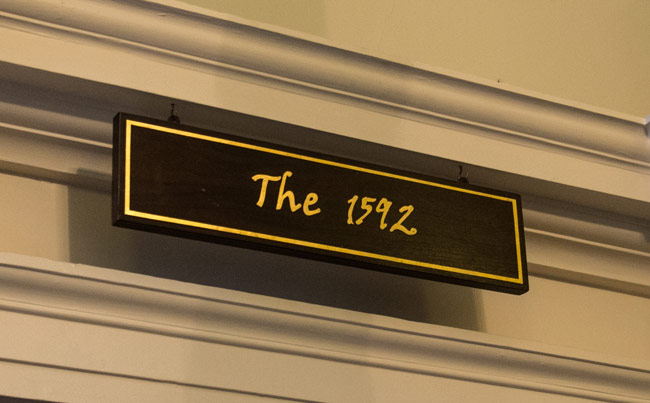More than €60,000 was spent in Trinity’s 1592 Restaurant in 2015 by College schools and departments, The University Times has learned. The School of Chemistry, the biggest spender, was invoiced for more than €2,600.
The 1592 Restaurant offers a fine-dining set-course lunch throughout the academic year. A two-course meal is priced at €20 and a three course lunch at €22. Staff can invoice the meal cost to their respective departments and schools using a departmental charge code. A compiled list of all invoices to schools and departments in the past calendar year, totalling €62,011.79, was provided to The University Times under the Freedom of Information Act.
In an email response to questions from The University Times regarding the €2,633.56 spent by the School of Chemistry in the restaurant last year, Prof Sylvia Draper, outlined the reasons for such a high total. According to Draper, the school organises a weekly research seminar that is attended by academic staff, postgraduate students and sophister students.
Draper explained that the external speakers receive no fee for giving a presentation at the seminar and many also act in a dual capacity for the school, for example by also acting as an external examiner. “The 1592 is the restaurant of choice for providing the post-seminar lunch for the speaker, given its convenience (only 1 hour is available) and it’s all-in inclusive lunch menu”, she said.
Most of the academics in the school also attend the lunch, which Prof Draper explains is an important networking opportunity: “These are staff undertaking research in a cognate area for whom networking and collaboration opportunities may emerge as result of the interaction.”
In addition to the weekly research seminar, the School of Chemistry also hosts other less frequent events in the 1592 Restaurant such as those “for visitors who are attending a donor presentation event.”
Other departments were also invoiced similarly large sums. The Trinity Long Room Hub spent €1,515.10 and the Office of the Chief Operating Officer was invoiced €1,370.80 over the calendar year.
In response to inquiry from The University Times, Prof Jane Ohlmeyer, Erasmus Smith’s Professor of Modern History and Director of The Trinity Long Room Hub, emphasised the importance of hospitality when fostering collaborations with other academics, as is the case with the Hub’s visiting research fellowship scheme and public lecture series. “The provision of a certain amount of modest hospitality is required on occasion to help develop relationships and we try to keep that expenditure in Trinity if at all possible”, she said.
Ohlmeyer also noted that “where hospitality costs are incurred this is funded through non-exchequer sources, such as philanthropic income or from income generated from indirect costs”.
Geraldine Ruane, Chief Operating Officer of Trinity College, provided a similar response in an emailed statement to The University Times. Similar to both Prof Draper and Prof Ohlmeyer, Ruane emphasised that using the 1592 Restaurant is more cost effective than external restaurants. Additionally, Ruane suggested that because of a larger staff and more contact with organisations outside college, “it is not surprising that our business costs in the 1592 Restaurant appear to be higher than other, smaller departments”.







